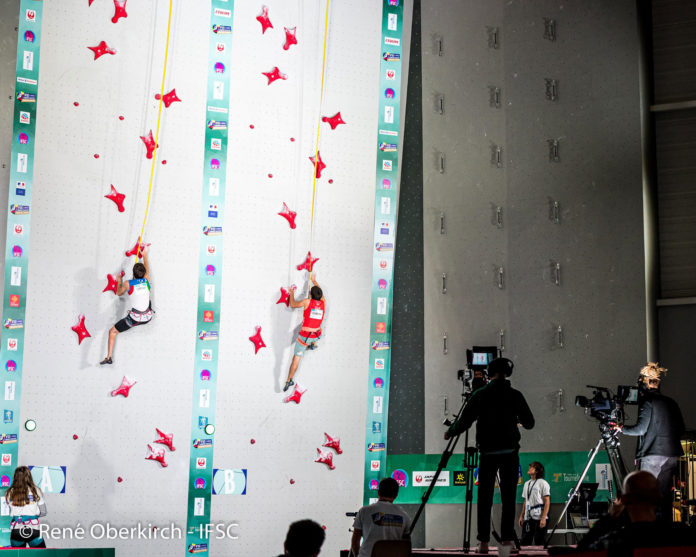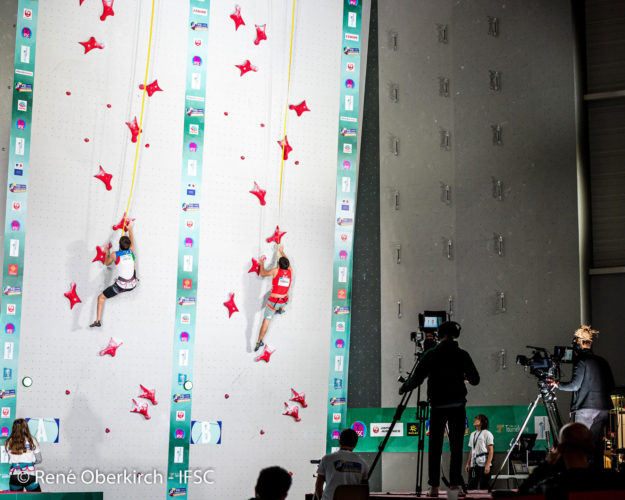
The summer of 2020 was set to be an historical moment for the sport of climbing and a celebration for many of its insiders. Decades of hard work and growth at all levels of the industry―from gyms to grips―would culminate in one international event: the Olympic Games Tokyo 2020. At the highest level of competition climbing, the International Federation of Sport Climbing (IFSC)―which formed in large part with the goal of permanent Olympic inclusion―would reach a milestone on its Olympic journey.
But that journey took a detour with the outbreak of the global coronavirus (COVID-19) pandemic. The Olympic Games in Tokyo were postponed to 2021, and so too the Olympic dreams of the qualified athletes training for gold. This summer there will not be the historical moment that was hoped for, but there have been moments of ingenuity amid the hardships of the pandemic crisis. Solving “problems” is literally what we do in climbing, and event organizers have been getting creative to solve the latest ones.
This month, for example, the IFSC held its first ever remote competition. Titled the IFSC Connected Speed Knockout, the event brought together more than 50 athletes from seven countries for a virtual competition in the Speed climbing discipline. An unusual format, the international event involved almost no international traveling. Instead, competitors raced up the standard Speed route on a 15-meter Speed wall in their region. Times were still compared as in a normal Speed competition, except the athletes weren’t climbing side by side but instead at five locations, some thousands of miles apart.
Headquartered in Torino, Italy, for many people across the pond the IFSC and IFSC events can seem like distant global affairs―especially when North American athletes are not competing in them. The international competition season restarted this month with the IFSC Connected Speed Knockout and first stage of the IFSC World Cup Series in Briançon, and the ongoing pandemic in the United States prevented its familiar faces from competing. But just as people behind the desk and behind the wrench have powered our industry at the local level, so too have developments at the international level been made possible through the hard work of real people with raw ideas.
Like many gyms in North America, the IFSC office was temporarily closed during the two-month lockdown in Italy. Staff members continued to work from home, including Alessandro Di Cato, the IFSC Event Officer who works in the IFSC Sport Department. In fact, the IFSC Connected Speed Knockout was initially a brainchild of Di Cato. To learn more about organizing such a unique event, Climbing Business Journal reached out to Di Cato for an interview. Our conversation led to a welcome discussion on the essence of sport, connection in a COVID-19 world, and the future of international climbing events.
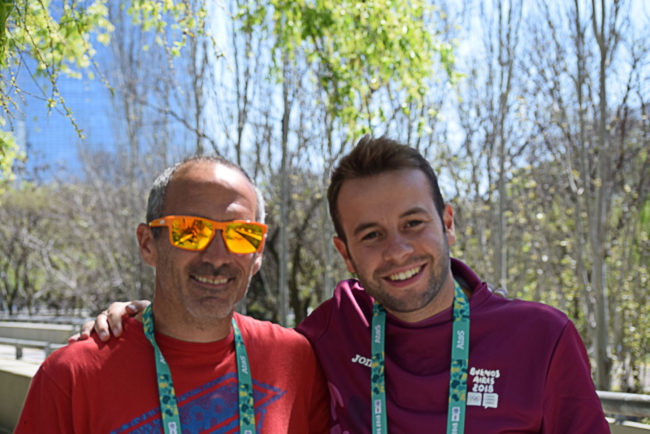
CBJ: It was fascinating to see the IFSC Connected Speed Knockout take place on the first weekend of August. Prior to the event, IFSC President Marco Scolaris congratulated the Sport Department for coming up with the idea. Could you please tell me more about how the idea originated?
Di Cato: Everything started with the Coronavirus and the fact that there was a kind of depression in the world of sport. With no events taking place, I started to think more about the key aspects of our job. And one of the key aspects of my work as Event Officer at the IFSC is helping organize our international events. The mission of the IFSC is to promote the sport of climbing worldwide, and one of the major ways we do this is through international events. At the core, what do you need for an international event? Of course you need a location, but then you also need international travel.
In particular, we wanted to create something for our athletes. From May to October, elite sport climbing athletes from all over the world have gotten into a routine of competing at IFSC events, which increases their visibility. But without events, that exposure and so much more is lost. And then there’s the IFSC itself. We wanted to do something new during this period, something that was innovative in order to continue promoting the sport.
I was thinking about the limits on international travel, the importance of international events, and even the nature of the sport climbing disciplines. Boulder and Lead are the two disciplines which receive the most attention, but competitions in these disciplines use different holds and walls, so it was hard to start planning a remote event with them. But for Speed, the sport equipment is the same everywhere. There is an homologation process with certified timing systems, auto-belays, holds and walls. So the Speed discipline provides the perfect characteristics to organize an event in different locations because you can have the same infrastructure in different places around the world.
And that’s when I thought, “Why not organizing something in different locations?” International athletes would be able to compete again in a season that has had many events postponed or cancelled, and they wouldn’t have to travel internationally to do so.
CBJ: What was one of the core aspects of international sport that was preserved with a remote format?
Di Cato: One of the main aspects of international sport is the opportunity to measure your strengths against people of other countries. I think this is one of the core values of sport in general―certainly not the only one, but an important one. In many ways, you don’t have sport if you don’t have competition. And international athletes want to measure themselves against the best athletes from other countries and strive to be the best in their respective disciplines. Holding an international event across different locations at least preserves that value: the ability to compare.
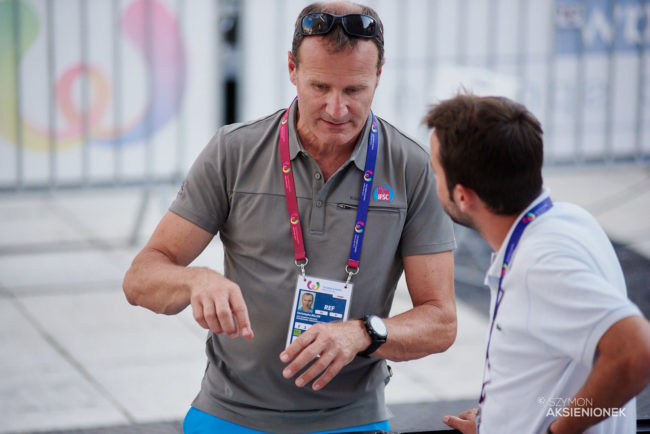
CBJ: Marco Scolaris also mentioned that “National Federations embraced the project with enthusiasm.” It must have been so different for the participating NFs and athletes to organize and host, train for and compete in such a unique event. What strategies were helpful in communicating the idea and building enthusiasm for the event among NFs and athletes in different regions, everyone navigating COVID-19?
Di Cato: First, I have to say that I really felt unity during this period. Together with the National Federations, we have really been united and always thinking about what’s best for the sport.
In general, the really good thing about this project was that everybody was happy to try it. Obviously athletes want to compete, and National Federations want to give the opportunity to their athletes to compete. People were pleased to have a sporting event, especially in a lockdown period―I really enjoy football as well, and at the time this idea was proposed football in Italy had not yet restarted―people really wanted to watch some sport, to take their mind off things. In so many ways it was valuable to produce something during this period, even if it was something quite different.
I’m always in contact with National Federations for my work, and event organizers especially. So I started to call the people I work with, basically, to contact people and ask them, “What do you think about this idea? Do you think your athletes would be interested?” Because in the end the IFSC is an international body, and a body that lives through its parts. When I asked for feedback, the overwhelming response was positive. Of course some of the National Federations were not able to do it due to restrictions around the pandemic or their training centers being closed.
Also, I need to say, on more pragmatic terms, it’s not very expensive to host an event of this nature. It’s quite easy to organize because all the National Federations I contacted have a permanent Speed wall in their country. Then it’s just a matter of coordination, arranging the video shooting and gathering all the athletes, etc.
CBJ: With a remote format, I can imagine there were many hurdles that were overcome to prepare the event itself. On the sport side, what special considerations needed to be given to maintaining a safe environment for the people onsite, as well as a fair competition across different fields of play, venues and officiating?
Di Cato: I think we need to start with acknowledging it is different from a live competition where everybody competes in the same field of play. Because even if we have certified sport equipment on different fields of play, conditions like the venues, humidity, temperature, time of day, etc., will still be different. We knew that when we started the project.
But at the same time we tried to enforce rules and measures in order to be consistent and have as fair of a competition as possible. Firstly, we asked each National Federation to appoint an international judge from our pool of judges. A second thing, we asked all the National Federations that wanted to participate to comply with the specifications of the IFSC for the official sport equipment, including the timing systems, speed holds, auto-belays, etc. Finally, we asked for only one continuous video, with no breaks or interruptions. This was requested just to ensure there were no second attempts made.
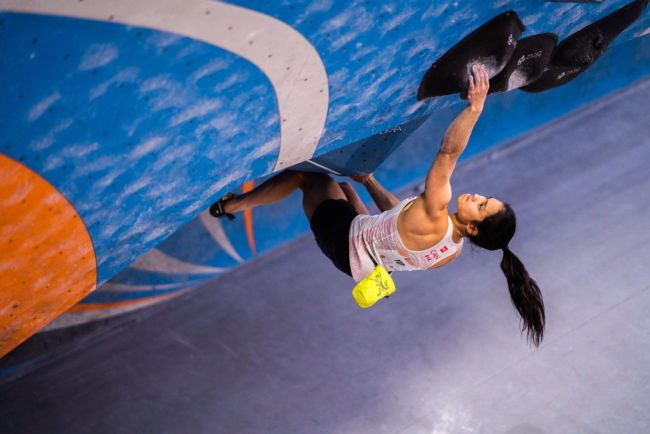
CBJ: On the communication side, what a challenge it must have been to promote an event taking place across different locations, as well as generate value for sponsors and interest from media. What special arrangements needed to be made to provide as-live streaming, and make the experience worthwhile for sponsors and media?
Di Cato: It required a lot of organization in advance, and in a short time frame. Because we launched this project around the middle of June. We were then in close contact with the event organizers so that everything would take place in a window of one week. All the climbing took place across one week, and then we gave ourselves another week to edit everything. The athletes wanted to know the results, since there is excitement around that.
So I have to say that the production team at Obsess Medias did a very good job. The event organizers send a two-hour video, and then you need to cut each single race and put it alongside another race that’s at a different minute in another video. So the production team was very involved, calling the local production crews and telling them exactly how they wanted it to feel.
In terms of media, we left this in the hands of the National Federations. Because, for example, the climbing in Innsbruck took place during the week of the Austria Summer Series. And during the Austria Summer Series there were already media onsite in Innsbruck.
CBJ: Aleksandra Kalucka of Poland, one of the winners of the competition, mentioned afterwards how strange it felt to compete in this format, since her “emotions were between competition and training mode.” Do you think this was one of the most challenging aspects for the athletes?
Di Cato: Yes, exactly. Because at the same time you practice with your colleagues in these settings and you are always comparing yourself with your team, but now you are also comparing your times at your national training center or climbing gym with athletes of other countries. So it is challenging for them in this way.
In addition, because the climbing took place at different times, for this event we also asked the athletes to make 1/8 final, ¼ final, ½ final and final runs―as if they were to make it―but they didn’t know if these runs would count. So they were always trying to do their best, but we weren’t able to show all the runs.
CBJ: Were there any other highlights around the event you can share that my questions didn’t cover?
Di Cato: I will say that for sure I was very happy when I saw the event was broadcast on Indonesian TV. They broadcast the full programme, and one of the winners of the competition, Rahmad Adi, climbs for Indonesia, so this was a nice story for their country.
Second story, obviously I asked feedback after the event from coaches and the people attending, and mostly they told me that the athletes were very happy and that it was a nice way to restart the season. For me this was the best part, because if the athletes are happy, everybody should be happy.
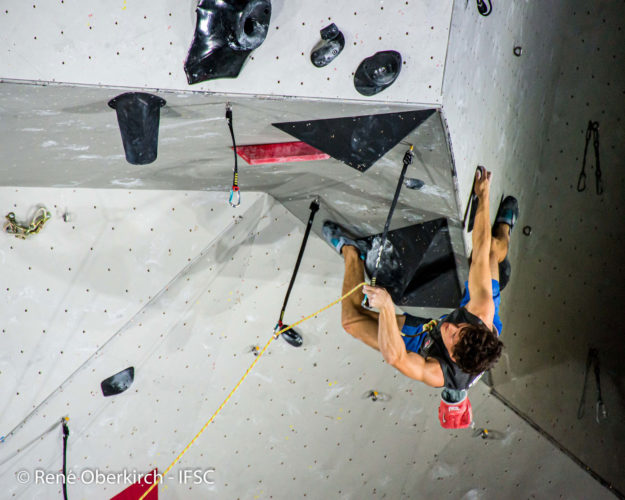
CBJ: In a few words, what should event organizers keep in mind when considering remote Speed events?
Di Cato: There is so much coordination that needs to be done prior to holding an event like this. All the National Federations need to arrange the perfect day, call the athletes, send you the start list and tell you who is going to compete. You find a date, you validate the sport equipment, you nominate a judge, you brief the judge, etc. So it requires a lot of coordination in advance.
CBJ: Looking into the future, are there other remote IFSC Connected Speed events in the works, and what would need to happen for an IFSC Connected Boulder or Lead event to be possible?
Di Cato: The Speed Knockout was a first test, which proved successful. At the moment we still need to have further discussions about whether we will be having other events like that for Speed. Then obviously we had the idea for Boulder and Lead, but it was definitely a further step. Because a little twist of one hold, just the slightest change, this is exactly the difference that can make one elite athlete winning over another at this level. But we are always keeping an eye on alternative models and events.
CBJ: Thank you Alessandro!
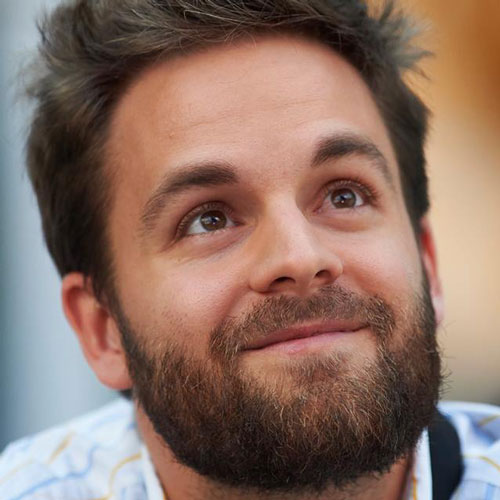
Joe Robinson has been working in the climbing industry for over a decade and currently manages CBJ editorial. He traveled the world as the IFSC’s community manager during Olympic inclusion and across the U.S. while writing for Alpinist, Climberism, DPM and CBJ. He also worked in local climbing gyms of the Pacific Northwest and West Michigan while advancing economic empowerment, educational equity, youth development and diversity programs of national nonprofit organizations.




